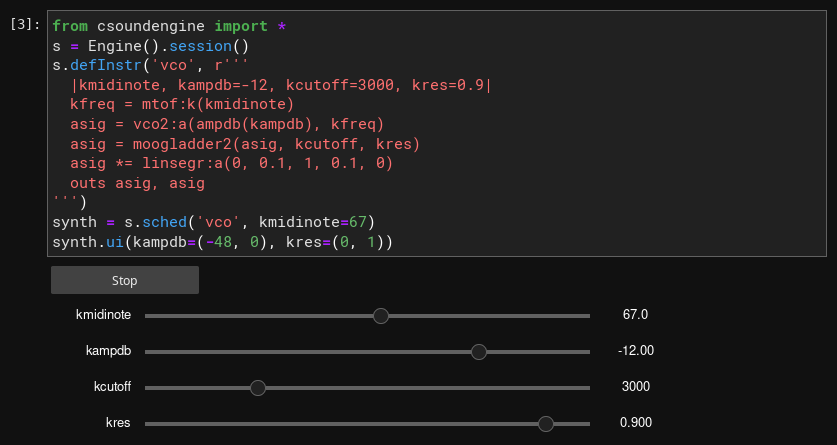This package implements an intuitive interface to run and control a csound process
https://csoundengine.readthedocs.io/en/latest/index.html
The core of this package is the Engine class, which wraps a csound
process and allows transparent control over all parameters, while providing
sane defaults. It uses the csound API to communicate with a running csound
instance. All audio processing is run in a separate performance thread.
from csoundengine import *
# create an Engine with default options for the platform.
engine = Engine()
# Define an instrument
engine.compile(r'''
instr synth
; pfields of the instrument
kmidinote = p4
kamp = p5
kcutoff = p6
kdetune = p7
kfreq = mtof:k(kmidinote)
; A filtered sawtooth
asig = vco2:a(kamp*0.7, kfreq)
asig += vco2:a(kamp*0.7, kfreq + kdetune)
asig = moogladder2(asig, kcutoff, 0.9)
; Attack / Release
aenv = linsegr:a(0, 0.01, 1, 0.2, 0)
asig *= aenv
outs asig, asig
endin
''')
# Start a synth with indefinite duration. This returns the eventid (p1)
# of the running instrument, which can be used to further control it
event = engine.sched("synth", args=[48, 0.2, 3000, 4])
# Change midinote. setp means: set p-field. This sets kmidinote (p4) to 50
engine.setp(event, 4, 50)
# Modify cutoff
engine.setp(event, 6, 1000, delay=4)
# Create a graphic interface to interact with this event. If running within a jupyter notebook
# a html gui is generated, otherwise a native gui is used:
engine.eventUI(event, p4=(0, 127), p5=(0, 1), kcutoff=(100, 5000))Each engine can have an associated Session. A Session provides a
higher level interface, allowing to:
- Define instrument templates (an
Instr), which can be instantiated at any order of evaluation, allowing to implement processing chains of any complexity - An
Instrcan have named parameters which can be used to control the event. - A
Sessionprovides a series of built-inInstr's to perform some common tasks, like playing samples from memory or from disk, perform audio analysis, etc.
from csoundengine import *
# Create an Engine and a corresponding Session using default options
session = Engine().session()
# create a master audio bus
masterbus = session.assignBus()
# define instruments
session.defInstr("synth", r'''
|ibus, kmidi=60, kamp=0.1, ktransp=0, ifade=0.5|
; a simple sawtooth
asig vco2 kamp, mtof:k(kmidi+ktransp)
asig *= linsegr:a(0, ifade, 1, ifade, 0)
; output is routed to a bus
busout(ibus, asig)
''')
session.defInstr("filter", r'''
|ibus, imasterbus, kcutoff=1000, kresonance=0.9|
asig = busin(ibus)
asig = moogladder2(asig, kcutoff, kresonance)
busmix(imasterbus, asig)
''')
session.defInstr("master", r'''
imasterbus = p4
asig = busin(imasterbus)
asig compress2 asig, asig, -120, -40, -12, 3, 0.1, 0.01, 0.05
outch 1, asig
''')
# Start a master instance at the end of the evaluation chain
master = session.sched("master", imasterbus=masterbus, priority=10)
# Launch some notes
for i, midinote in enumerate(range(60, 72, 2)):
# for each synth, we create a bus to plug it to an effect, in this case a filter
# The bus will be collected once all clients are finished
bus = session.assignBus()
# start time for synth and effect
start = i * 1
# Schedule a synth
synth = session.sched("synth", delay=start, dur=5, kmidi=midinote, ibus=bus)
# Automate pitch transposition so that it descends 2 semitones over the
# duration of the event
synth.automatep('ktransp', [0, 0, dur, -2], delay=start)
# Schedule the filter for this synth, with a priority higher than the
# synth, so that it is evaluated later in the chain
filt = session.sched("filter",
delay=start,
dur=synth.dur,
priority=synth.priority+1,
kcutoff=2000,
kresonance=0.92,
ibus=bus,
imasterbus=masterbus)
# Automate the cutoff freq. of the filter
filt.automatep('kcutoff', [0, 2000, dur*0.8, 500, dur, 6000], delay=start)https://csoundengine.readthedocs.io/en/latest/Installation.html
- python >= 3.9
- csound 6 >= 6.16 (https://github.com/csound/csound/releases).
pip install csoundenginecsoundengine also needs many csound plugins (https://github.com/csound-plugins/csound-plugins/releases), but these are installed automatically if needed.
https://csoundengine.readthedocs.io
- csoundengine is used as the audio engine in maelzel


